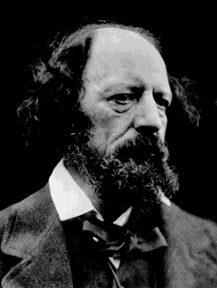|
Tennyson’s In Memoriam Sections 50-58: "The Song of Woe is After All an Earthly Song" |
| Sections fifty through fifty-eight, which Tennyson
himself understood to be a unit of thought, are a miniature theodicy
that explores both the poet’s fears concerning the implications of scientific
naturalism and also his doubts about the purpose and limits of his poetic career. Rather
than being a philosophical apologetic that seeks to answer Tennyson’s doubts, this
particular grouping of lyrics is a "song of woe" which serves as a catharsis of
voiced expression. In other words, Tennyson is more concerned with
"singing" about his doubt than solving it. Its final answers are artistic
and intuitive rather than logical and explicit. Often these work in a kind of thesis/anti-thesis fashion, yet the lyrics of doubt are finally contextualized within the larger frame of love for (if not entirely faith in) the dead, esp. Hallam. Tennyson does not choose to answer the desperate implications of naturalism; instead, he sings them because he is a creature of the finite earth. The songs are not an assurance of faith but an overflow of love. And their doubt exists within the rhythm of that love. #51-53 (LI-LIII) and #57-58 (LVII-LVIII) can be found at the following website: Click here Basic Structure/ Overview 50. 1-14 – Tennyson asks for Hallam (and/or the dead or God) to be near him in the midst of adverse circumstances – darkness, suffering, and death. 50. 15-16 – The last two lines hint at a reversal in the next realm: "the twilight of eternal day." 51. 1-8 – Tennyson wonders if we want the dead near us, for they perhaps see with greater clarity and thus see our secret shameful deeds. 51. 9-16 – Yet he recognizes that his love can be forgiven its lack of faith. The dead must have great wisdom and insight and thus have great mercy on those still in this life. 52. 1-4 – However, his love is ineffective because it is made up of words which are only surface. 52. 5-8 – The "Spirit of true love" (Personification? Hallam? God?) replies that the poet should not blame "the plaintive song" because (she/ he/ the dead?) will continue to be near Tennyson. Human sin/weakness can’t force this spirit away. 52. 9-12 – What keeps us true to our ideals then? [Lines 11-12 are the most problematic: either Christ is not an example for sinful humans; or Christ, the sinless one, does not keep record of sinful human ways.] 52. 13-16 – Thus, don’t worry over one’s faults because the next realm promises our lives’ good will be separated from our current fault. 53. 1-10 – Tennyson entertains the theory that the sins of youth prepare one for the maturity of adulthood. 53. 11-16 – Yet he rejects this because it might become an excuse for hellish behavior. 54. 1-16 – [Reflecting on this] Tennyson holds out hope that all "ill" has its purposes – pain, sin, defect, and "taint." Yet he admits to not knowing anything. 54. 17-20 – He dramatically reverses this hope with his limits. Being an infant "with no language but a cry," he scorns it all. 55. 1-12 – Such a dream is based on a subjunctive inner sense, while the natural objective world seems to offer no evidence for this. Nature seems wasteful in natural selection, being more concerned with the species than the individual. 55. 13-20 – Tennyson describes his faltering, fainting, limited trust within this darkness. 56. 1-16 – Yet nature is not even concerned with species; the forces of extinction eliminate multitudes. He wonders: are even human beings, despite all their seeming value, religious hope, and commitment to the truth and justice, destined for extinction? 56. 17-21 – If they are, then they are worse than the dinosaurs, for the dinosaurs seem to belong to such a ruthless order. Life then is futile. 56. 22-24 – Can the voice of the dead be heard? Do they offer any answers or "redness"? Both are "behind the veil." [Of course, this is double-ended – if they are veiled, we cannot be sure if they really exist at all.] 57. 1-8 – Tennyson recommends peace because his song of woe is "an earthly song." As a result, it is a limited work that will not last in the same way that Hallam’s spirit does. 57. 9-16 – Nonetheless, it serves its purpose here as a memoriam to Hallam’s existence, as a kind of greeting (and/or prayer) to the dead. 58. 1-8 – Tennyson reflects that this woeful song disturbed the peace of others who are vaguely aware of their own coming deaths. 58. 9-12 – Yet Urania reminds him that he need not continue to grieve others but look forward to a better, more exemplary death someday. The Limits of Knowledge/ Faith This set of Tennyson's poems is full of imagery that stresses the limits of both Tennyson's faith and his knowledge. What do you think he is trying to suggest by such language? Here is a partial list: 50:1. "when my light is low" 50.6 "pangs that conquer trust" 50.9. "my faith is dry" 50.13. "when I fade away" (death but also within the sense of limits) 51.10. "Shall love be blamed for want of faith?" 51.15. "With larger other eyes than ours" 52.3-4. "My words are only words, and moved/ Upon the topmost froth of thought." 53.4,9. "And dare we to this fancy give…Yet who would preach it as truth" 54.13. "we know not anything" 54.20. "with no language but a cry." 55.10. Nature’s "secret meaning is her deeds" 55.16. "slope thro’ darkness up to God" 55.20. "To what I feel is Lord of all,/ And faintly trust the larger hope." 56.28. "Behind the veil, behind the veil" 57.8. "But I shall pass; my work shall fail" 58.1-4: "[T]hose sad words" act as disturbing echoes.
|
|
